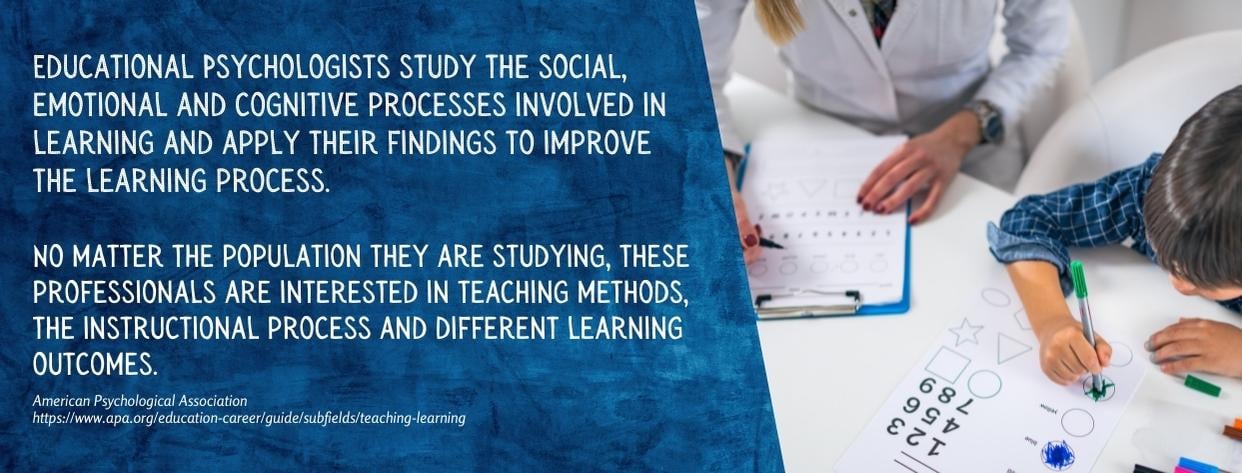10 Best Online Doctor of Educational Psychology Degree Programs

Find your perfect college degree
Students in online Doctor of Educational Psychology programs learn about the best practices in learning that enable individuals to absorb, retain, and apply new information.
Doctoral programs in Educational Psychology have underlying Philosophy principles, curriculum structure, as well as learning outcomes that change over time. The changes in policies, principles, and practices about education and mental health have a direct impact on Educational Psychology and school psychology.
Quick audio summary:
Methodology
We chose these programs based on the following criteria.
- Hybrid programs with on-campus residency or in-person internship requirements
- Classes designed for convenience and flexibility for working professionals
- Comprehensive didactic coursework with an emphasis on research and application
- Qualified faculty members
- Financial aid options available
- Availability of Student Assistance and Career Guidance Centers
- Regional and programmatic accreditation
Visit our Methodology for more details on our college or doctorate program evaluation process.
The Best Online Doctor of Educational Psychology Degree Programs
The Chicago School of Professional Psychology

EdD in Educational Psychology and Technology
The Chicago School of Professional Psychology’s EdD in Educational Psychology program has a part-time program of study with a three-year time-to-completion. Students prepare for successful careers as educational psychologists, school psychologists, and college professors, among other career paths.
Students learn about real-world applications of the technology as well as the theories and practices used in the Educational Psychology field. There are two on-campus residency sessions.
Available concentrations are in:
- K-12 Education Learning and Technology
- Higher Education Learning and Technology
- Instructional Design
Liberty University

EdD in Curriculum & Instruction: Educational Psychology
The fully online, non-licensure, 54-credit EdD in Curriculum and Instruction – Educational Psychology program at Liberty University combines theoretical research and practical applications. With up to 50% transfer credits, time-to-completion is 2.5 years.
Students tackle specialized courses, including:
- Survey of Educational Research
- Theories and Research in Developmental Psychology
- Advanced Educational Psychology
Students can also tailor their doctorates through electives.
Wichita State University

EdD in Educational Leadership – Educational Psychology
Students complete 55 graduate hours to earn the online EdD in Educational Leadership – Educational Psychology degree with the option to earn the Mentoring & Coaching Graduate Certificate.
The didactic coursework includes core courses followed by dissertation courses, such as:
- Psychology of Leadership, Persuasion, and Influence
- Research Methods and Analysis: Quantitative and Naturalistic
- Cognition and Instruction
Students customize their degrees through electives, participate in faculty-led research projects, and acquire advanced research methods and analytics skills.
Regent University

Ph.D. in Education – Educational Psychology
The online Ph.D. in Education – Educational Psychology Specialization program covers diverse topics to prepare students and candidates for careers in academia and other industries. Students must complete at least 67 credits with core courses like:
- Psychological Underpinnings of Learning
- Advanced Research Design and Analysis
- Regression and Correlation
Students must complete an acceptable research-based dissertation. Graduates are prepared for the challenges of intellectual leadership and for teaching positions with a Christian worldview.
California Coast University

EdD in Educational Psychology
The EdD in Educational Psychology program encourages students to challenge the current principles and practices in the Educational Psychology field. Working professionals benefit from the self-paced program of study and asynchronous classes, as well as affordable tuition and interest-free installment payment plans.
Applicants must have 3-5 years of education-related professional experience, a master’s degree, and a writing sample. Students in the 66-credit program must pass a qualifying exam and a comprehensive exam, as well as writing assignments and a dissertation.
Capella University

Ph.D. in Psychology – Educational Psychology
The Ph.D. in Educational Psychology program at Capella University is designed for individuals interested in advancing their skill sets in education and research. Students conduct research in diverse areas and tackle topics in higher education instruction, instructional technology, and corporate training.
Students complete 87 credits with courses in:
- Learning Theories in Psychology
- Principles of Educational Psychology
- The Psychology of Teaching
Other requirements are nine specialized courses, three seminars on doctoral project development, a comprehensive exam, and a dissertation.
With more financial aid available, students graduate with less debt.
Walden University

Ph.D. in Psychology – Educational Psychology
Students learn psychometric tools with a focus on adult learners and can earn their degree in a shorter period via an automatic waiver of up to five courses with a master’s degree.
The curriculum includes foundation, core and research courses, as well as specialization courses. Students complete a doctoral dissertation with corresponding courses and participate in four 4-day residencies.
The core courses include:
- Teaching of Psychology
- Research Foundations
- Consulting for Organizational Change
Students choose from three tracks based on their academic credentials but can earn their degree in eight years, maximum.
Alliant International University

PsyD in Educational Psychology
Alliant’s 50-credit program with a two-year time-to-completion is unique because of its psychology-centric focus. The program of study emphasizes social justice and equity with practical applications in school counseling and other aspects of human development. Applicants must possess a certification or license in school psychology to be considered for admission.
Core courses include:
- School, Family, and Community Relations
- Current Issues and Trends in Education
- Research Design
Graduates are eligible to teach at community colleges and four-year universities.
Michigan State University

Ph.D. in Educational Psychology & Educational Technology
Students in the hybrid program enjoy on-campus experiences, too, meaning they have more research, socialization, and networking opportunities. But there’s no guaranteed funding, except for eligibility for research and teaching assistantships.
Students can enroll in 1-2 courses every term (fall, spring, and summer) and earn the degree in 5-6 years.
Courses include:
- Educational Inquiry
- Quantitative Methods and Qualitative Methods
- Cognitive Development
Hybrid students tackle the same courses as their on-campus counterparts but use virtual technologies like Zoom. The courses may be in synchronous and asynchronous formats.
Texas A&M University

Ph.D. in Educational Psychology
The hybrid program emphasizes the close relationship between human development and learning. Students develop a multidisciplinary perspective of the Educational Psychology field, from learning strategies to statistics.
Students complete 90 credits with the intensive coursework featuring courses in:
- Introduction to Educational Psychology
- History and Systems of Psychology
- Developmental Psychology
The doctoral program can be completed in four to seven years. Students, however, must meet dissertation requirements and choose between two tracks: Educational Track and Experimental Track.
Overview of Online Doctor of Educational Psychology Degree Programs
There are three major types of Educational Psychology degrees:
- Doctor of Philosophy (Ph.D.) in Educational Psychology
- Doctor of Education (EdD) in Educational Psychology
- Doctor of Psychology (PsyD)
Time-to-Completion
The general rule is 4-5 years of full-time studies, but be mindful of the maximum time to completion.
Format, Curriculum, and Courses
Aside from the didactic courses, which can range between 40 and 70 credits, students must also comply with the following requirements.
Major Examinations
- Qualifying exam
- Preliminary exam
- Final oral and written exam for dissertation presentation and defense
Doctoral Dissertation
The dissertation is a common PhD requirement. It must contribute to the fields of Educational Psychology, Educational Technology, or Instructional Design.
Skills and Competencies Gained
Educational psychologists must possess the following competencies:
Technical Skills
- Psychological assessment using psychometric tools
- Statistics
- Academic and learning interventions
- Professional ethics and law
- Instructional support
Transferable Skills
- Communication skills
- Public speaking
- Empathy and compassion
- Attention to detail
Tuition and Financial Aid
The typical tuition fee ranges from $400 to $1,400+ per credit hour. Federal financial aid, as well as grants, assistantships and scholarships in Psychology graduate programs are available.
Licenses and Registrations
All states require school psychologists and educational psychologists with clinical practice to possess a license. The license requirements vary by state, but supervised clinical experience, passing a national certification exam, and continuing education are common.
Educational psychologists who work as researchers and consultants aren’t required to possess a license.
Board certification doesn’t exist yet for educational psychologists. However, the Association of State and Provincial Psychology Boards (ASPBB) offers a Certificate of Professional Qualification in Psychology.

Frequently Asked Questions
Is a PsyD degree equivalent to a PhD in Education program?
No, it is not. A Ph.D. degree is suitable for researchers, while a PsyD degree is best for clinical practitioners.
Are educational psychologists and school psychologists the same?
No. Educational psychologists are more concerned with education and learning. School psychologists are more focused on mental well-being. Depending on factors such as level of expertise and experience and industry, Psychology professionals in these concentrations are well-paid.
Are educational psychologists allowed to diagnose learning disorders?
Yes, they are allowed to diagnose dyslexia, dyscalculia, and other learning disorders.
What can Doctors of Educational Psychology expect career-wise?
The following paints a picture of how Educational Psychology doctorate degree holders contribute to the field, and what they earn from the work they do.
| What They Do | – Assess the learning needs and design appropriate learning interventions – Work in K-12 students, student-professional, and adult-learner educational settings |
| Projected Employment Growth Rate (2022-2023) | 10.4%, or 12,300 new jobs |
| Average Annual Pay | $92,813 |
| Career Pathways | – School counselor – School psychologist – Training and development manager |

Key Takeaways
Earning a Doctor of Educational Psychology degree boosts career advancement opportunities in academia, corporate training, and other occupations. Challenges in earning a earning a doctorate include academic rigor and dissertation completion.
Additional Resources:




